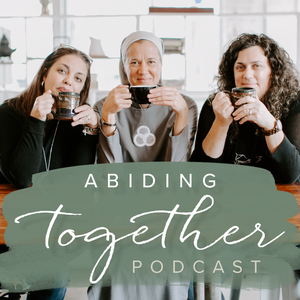
Messy Family Podcast : Catholic Conversations on Marriage and Family
Mike and Alicia Hernon : Catholic Marriage Parent and Family
- 41 minutes 28 secondsMFP 317: Who are These Messy Families? 2024 Survey SummarySummary
Since 2018 we have been doing surveys of our listeners to find out who you are, how we can serve you more, and what your needs are. We have never shared this information with our listeners until now! Over the years we have had thousands of listeners take this survey and it's interesting to see what has remained the same and what has changed. We thought it would be encouraging to you to hear that you are not alone! The struggles that you have told us about are shared by other moms and dads too. Listen in as we talk about the make-up of most of our listeners, what they told us, and what plans are for the future. There were also some questions that came up in the survey that we responded to as well.
LinksLast call for the survey! Closing Jan 31, 2025 https://www.surveymonkey.com/r/T59LDRY
UK Tour - if you are interested in joining us for any events check out our page here!
www.messyfamilyproject.org/uk-tour-2025
20 January 2025, 12:00 pm - 59 minutes 15 secondsMFP 316: A Manual for Catholic Families
“Catholic parenting is above all a work of grace” - Fr. Carter Griffin
We often say there is no manual for being a parent, but this book comes pretty close! In this podcast, we interview the author of Forming Families, Forming Saints Fr. Carter Griffin. Fr. Griffin has worked for years forming young men into priests in the seminary setting. In doing so, he saw many similarities between what he was doing with young men and what parents were doing at home. The four pillars of formation in the seminary - human, intellectual, spiritual, and apostolic - can be applied in the family as well! In both settings, ultimately God is the one who does the transforming in people’s lives, but He does choose to use us in the process. We believe this book is a valuable resource for parents that they will be able to refer to again and again.
Key Concepts-
Parents are proxies. God is the ultimate shaper of their hearts and minds, but He chooses to use us in the lives of our children
-
In the past decade or so there has been an emphasis on the importance of childhood and parenting on a person’s life. This knowledge is good, but it also has put an incredible amount of pressure on parents to “do it right”.
-
The four pillars of seminary formation - Human, Spiritual, Intellectual, and Apostolic can be applied for parents forming children within the home.
-
The most successful parents create an environment of trust in the home through continual dialogue with their children while sending the message that they don’t just love their kids, but they like them too!
-
Parents need to know they are not alone! There are many other families working alongside you and we have a great cloud of witnesses cheering us on.
-
Consider the four pillars that Fr. Griffith describes. How is our child doing in each of these? Can we make a goal for them in each area?
-
Are we overwhelmed by the responsibility of parenting? How can we rely on God more for the grace that we need and for the grace that our children need?
Find out more about our UK tour in March - https://messyfamilyproject.org/uk-tour-2025/
Event in New Jersey with Array of Hope - Beloved https://arrayofhope.regfox.com/beloved
13 January 2025, 11:00 am -
- 52 minutes 45 secondsMFP 315: 10 Things to Stop Doing in 2025
At the beginning of 2025 we want to challenge parents to step back and reassess their approach to family life by diving into 10 Things to Stop Doing in 2025. Are you focusing too much on your kids? Caught up in the frantic pace of life? Trying to "fix" your spouse or juggle it all? Let us give you some heartfelt encouragement to let go of habits that create stress, disconnection, and overwhelm. We guarantee this episode is packed with insights that will inspire you to parent with purpose and peace. Let’s start the year by simplifying, slowing down, and focusing on what really matters! Listen in and get ready to share and bookmark this episode to listen to again and again!
Free Family Board Meeting Webinar: https://messyfamilyproject.org/fbm-webinar/
7 January 2025, 8:57 pm - 58 minutes 43 secondsMPF 314: Seasons of Prayer for Parents
“Be patient with everyone, but above all with yourself. I mean do not be disheartened by your imperfections, but always rise up with fresh courage” - St. Francis deSales
SummaryWhat God asks of us as parents is beyond our ability. We are all in need of God’s grace and that comes through prayer! Now, before you think, “I do not have time for prayer….” take a pause and listen to this episode. First, remember, we have been there! We had 3 kids under 3, 7 kids under 10 and then 10 under 16! We know that the crazy pace of life can make us feel like we can never catch our breath. That being said, we must persevere through the different seasons of life and make sure that we are consistently connected to the source of all life. Listen in to find ways of “sneaking in” prayer throughout your day, what you may have to let go of, and what you should be able to accomplish. Do not lose heart! Prayer is not only possible, but it is essential for us to live the life God is calling each of us to.
Key Takeaways-
The spiritual responsibility of our home lies with parents and it always has. They are essential because they are the first witnesses of the faith to their children.
-
You cannot be an effective parent without prayer
-
Take advantage of all types of prayer, but we usually need to work the most on prayer of contemplation. This is where we grow in relationship with God in a personal way.
-
If we need to grow it is going to cost us. There is no easy button.
-
There are seasons in life, and our devotion needs to match it.
-
Take advantage of the seasons of the year to start fresh!
Couple Discussion Questions-
What type of prayer are we taking advantage of right now? How well are we doing it?
-
How can we support each other in growing in our prayer life?
Resources16 December 2024, 11:00 am -
- 53 minutes 36 secondsMPF 313: Surviving the Holidays with Grace
Kids will not always remember what you say, they will remember how they felt.
SummaryWe have talked about the time between Thanksgiving and New Year’s being the “Momolympics”, a time when there are tons of things to buy, make, prepare, plan, and basically the happiness of your children all depends on you (at least we feel that way!) How can parents embrace the holidays with children with grace and excitement? How can we keep in mind what is truly important for our family? In this episode we give some principles, but also LOTS of practical advice as we look back on all the different holidays we have had with our large family. Things look different now for us, but we can see in hindsight what worked well for us, and what was unnecessarily stressful! This is an amazing time of year and when you have kids the happy times are even more joy-filled, but the tough times can be really exhausting. We are here for you as you work to be intentional, even if you are a messy family!
Key Takeaways-
The more you plan in advance the less rushed you are going to be. This will help you simplify so you can focus on what really matters.
-
Keep in mind the order of your family culture! Spiritual life of the home, marriage, relationships, developing gifts and then the operations of the family.
-
Get the kids involved! When they own traditions, it strengthens your family culture when they take on responsibilities for the holidays.
Couple Discussion Questions-
What are the traditions that we want to double down on and make sure they happen this year?
-
How are we going to reduce stress and delegate work to the kids? What is our plan to get them involved?
Resources-
Throwback Friday: Toys! by Regina Schmiedicke
-
MFP267: Toys and the Imagination
9 December 2024, 12:00 pm -
- 1 hour 12 minutesMPF 312: The Well Ordered Family
Graces can flow into your home when nature is in its proper place. - Connor Gallagher, The Well-Ordered Family
SummaryDo you yearn for more order and clarity within your family? Is the chaos and busyness of modern life unsettling the harmony of your household? In this podcast, we interview Conor Gallagher, CEO of multiple businesses and father of sixteen, to talk to him about a transformative system that will restore peace and joy in your household. We love using business principles to improve family life, and in the Well-Ordered Family, Conor does just that! Join us for this conversation and find out why its good to realize that we all have systems in our home, how to get control of those systems, and why it is essential that parents not fall into a victim mentality. Find more about The Well-Ordered Family at https://wellorderedfamily.com/
Key Takeaways-
We all operate with systems in the home whether we realize it or not. The question is, are these systems effective?
-
There are many policies that families need to implement, but if you have to start with one, start with your tech policy!
-
When you are trying to get control of your family life, start by asking the question Why? Why are we trying to live a certain way?
-
Parents need to be the architects of their family’s life and habits. No one else can do it for you.
Couple Discussion Questions-
What are the systems in our home that most need attention right now?
-
Are we falling into a victim mentality when it comes to running our home? How can we break out of that cycle?
2 December 2024, 12:00 pm -
- 43 minutes 54 secondsMFP 311: Family Roots - Mike's Irish Experience
In this episode, we dive into the beauty and power of family history. Mike shares the incredible story of his journey to Ireland—a dream rooted in a deep love for his heritage and a promise to pass it on to his children. From the ruins of his grandfather’s cottage to the windswept cliffs of the Aran Islands, the trip becomes a testament to the importance of staying connected to the past while building a legacy for the future.
As we reflect on the stories of those who came before us, we’re reminded of the sacrifices and struggles that shaped who we are today. Alicia and Mike discuss how understanding our roots can ground us in our present and inspire us to leave a rich legacy for those who will follow. Whether it’s through reclaiming a family cottage or sharing stories with your kids, this episode is a call to embrace the sacred work of family.
We also explore how the holiday season offers a perfect time to reconnect with family traditions. From meaningful Advent meditations to practical tools like the Family Board Meeting course, we’re excited to help you create a home that is intentional and full of life.
✨ A Few Takeaways:
- The power of family stories to shape our identity and inspire our future
- The importance of honoring both the joys and struggles in our family history
- How to talk with your kids about their roots in a meaningful way
🌟 Featured Resources:
- Beautiful Advent books with Jesse Tree meditations and ornaments
- The Family Board Meeting webinar on December 8th
- Exclusive Advent bundles to enrich your holiday traditions
🙏 Let’s pray together for the grace to live lives worthy of those who came before us, and to build homes filled with faith, hope, and love.
💖 If this episode speaks to you, consider supporting the mission of the Messy Family Project. Your generosity makes everything we do possible—from free resources to life-changing events. Together, we can strengthen families and inspire faith.
#FamilyStories #HeritageAndHope #MessyFamilyProject #RootedInFaith
25 November 2024, 12:00 pm - 1 hour 4 minutesMPF 310: Marriage, Teamwork, and Business - an interview with Dan and Brenda Vansteenburg
“Guided and strengthened by God’s grace, husband and wife advance their own perfection… and contribute jointly to the glory of God” ~ Gaudium et Spes
SummaryYou should never marry someone with the idea that you can change them, but we do need to help our spouses become the best version of themselves. We all should have a vision, a belief that our spouse can be amazing and then work with them for their good. In this podcast, we hear the inspiring story of Dan and Brenda - a couple from two different families, faith backgrounds, and life philosophies. Though they were different, they were able to learn from each other and build an incredible life together by the grace of God. Through their story, we were able to draw out lessons that all of us can learn from.
18 November 2024, 1:00 pm - 52 minutes 30 secondsMPF 309: How Busy is Too Busy?
Show me your checkbook and your datebook and I will show you what you value
SummarySo much of what we talk about on this podcast really hits home when it comes to how we spend our time. Family dinner, date nights, prayer time, even mass comes down to making time to do it. Four things determine how we run our lives and our family - talent, money, energy and time. Every one has different amounts of energy and talent and money, but we all have the same amount of time! How we use it is what matters. In this podcast we discuss how to evaluate the activities in our home and what we need to prioritize. This is a re-release of the podcast “Busyness” originally aired in the summer of 2017.
Couple Discussion Questions-
Where in our life are we too busy? Where do we need to make time for what is really important?
-
Where do we need better routines in our home to bring peace?
11 November 2024, 12:00 pm -
- 53 minutes 57 secondsMPF 308: The Power of Asking for Forgiveness
“Genuine humility never disturbs the soul. Rather it is accompanied by peace, joy and calm” St. Theresa of Avila
SummaryWhat is the biggest problem in Catholic marriages? Although we appreciate good communication tools, marriage insights, and mentors - at the end of the day the biggest problem is simply a lack of holiness. One essential tool in our quest for holiness is learning how to ask for forgiveness. When we have conflict in our home, we all need to ask ourselves the question - what could I have done differently? When we take ownership in this way, we can repent to God and then ask forgiveness of our spouse or children in order to repair that relationship. Often we will focus only on our sins and try to amend our lives, but in addition to those good things, we also need to seek to reconcile the relationship and ask for forgiveness.
Key Takeaways-
When there is conflict in the home, we always need to ask ourselves how have I contributed to this situation and what could I have done differently?
-
Taking extreme ownership means that you don’t make excuses, but instead recognize that the past does not have power over you any more. You always have a choice.
-
When you are aware of your weakness, you are more open to asking for forgiveness and growing in holiness
-
Asking forgiveness also repairs the rupture in the relationship that happens as a result of our actions.
-
When you ask forgiveness and make your heart pure through Confession, then you are able to more clearly see God. “The pure in heart shall see God” Matt 5:8
-
A daily examen should include asking for forgiveness of family members we have sinned against.
Couple Discussion Questions-
Reflect on your marriage and children and ask God to show you areas in which you need to change. Go to your spouse and children and ask their forgiveness.
-
When can we do a daily examen in our household? How can we incorporate regular asking of forgiveness?
References:
Dealing with Failure podcast: MPF 140
Forgiveness and Transformation MFP 165
Romans 12
Matthew 18:21-35
4 November 2024, 11:00 am -
- 1 hour 1 minuteMFP 307: Navigating Family Life Challenges: Q&A with Real-Life Struggles and Faith-Filled Solutions
In this special Q&A episode, we dive into some of the most heartfelt questions from our listeners. From the complex question of whether to expand the family to grappling with grief, boundaries in marriage, and integrating elderly parents into a household, these issues strike at the core of family life. We also tackle how to balance the call to evangelize in a world that often conflicts with our values—especially when raising children in today’s cultural climate. Join us as we explore these tough topics with compassion, real-life insights, and guidance for finding peace, strength, and unity in family life amidst life’s many challenges.
Couple Discussion Questions
-
Expanding the Family: How do we each feel about the possibility of having more children, and what are our hopes or concerns? How can we respect and support each other’s feelings in this decision?
-
Emotional Connection and Boundaries: Are there areas where we hold back in sharing our emotions? How can we create a safe space to be vulnerable and open with each other?
-
Navigating Grief and Hard Times: How have we supported each other through past challenges, and what can we learn from those experiences to better support each other now?
-
Integrating Family Generations: If we needed to bring an elderly family member into our home, what expectations and boundaries would help create harmony for everyone?
-
Raising Kids with Faith in a Secular Culture: What are our biggest concerns about raising children in today’s world, and how do we feel called to engage with those who have different values while protecting our family’s faith?
28 October 2024, 10:00 am -
- More Episodes? Get the App
Your feedback is valuable to us. Should you encounter any bugs, glitches, lack of functionality or other problems, please email us on [email protected] or join Moon.FM Telegram Group where you can talk directly to the dev team who are happy to answer any queries.
 Girlfriends (A Podcast for Catholic Women)
Girlfriends (A Podcast for Catholic Women)
 Abiding Together
Abiding Together
 Catholic Sprouts: Daily Podcast for Catholic Kids
Catholic Sprouts: Daily Podcast for Catholic Kids
 Saint Stories for Kids
Saint Stories for Kids
 Restore The Glory Podcast
Restore The Glory Podcast
 Saints Alive Podcast
Saints Alive Podcast